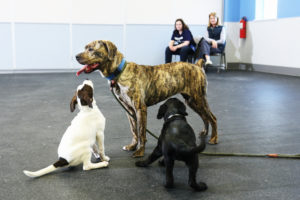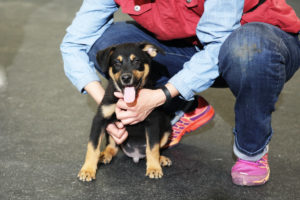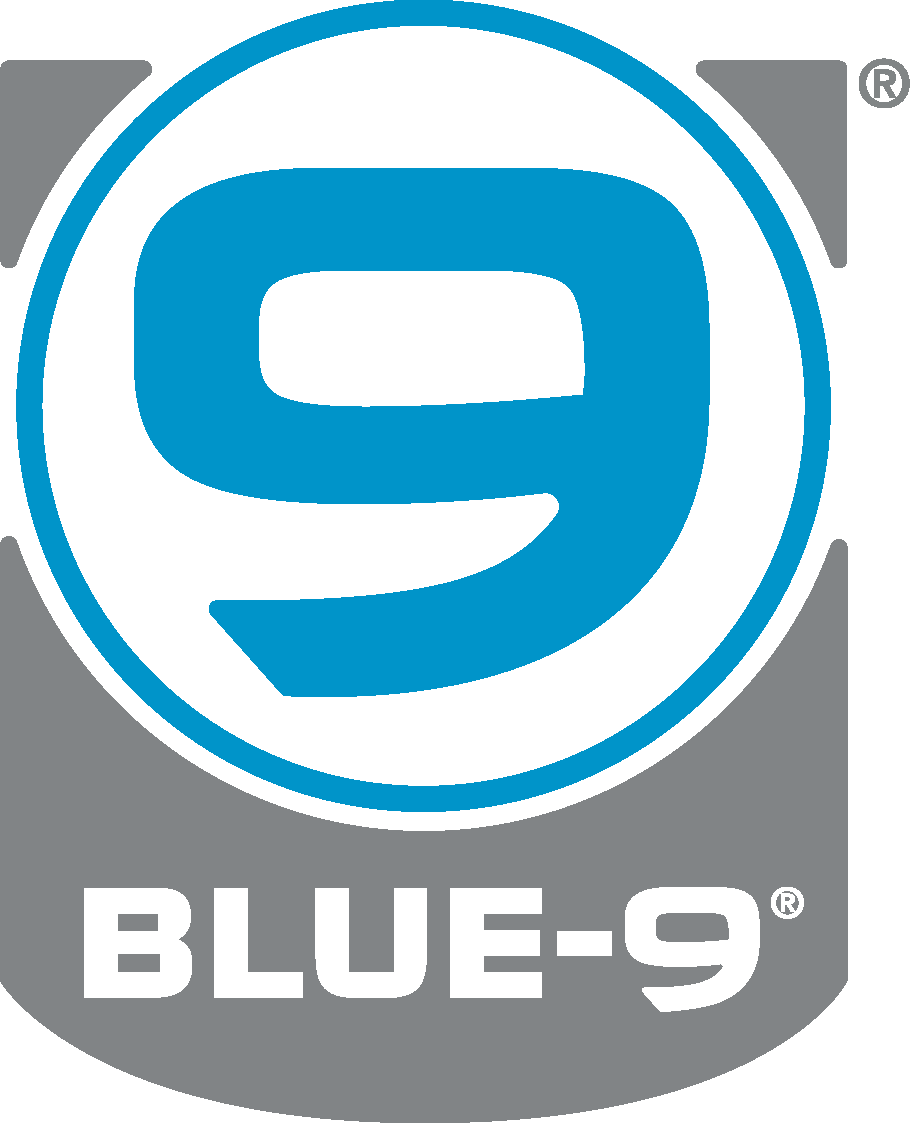The 7 Most Important Things to Teach a Young Puppy
We all agree that puppies are unbelievably cute, but there’s much more to their early days than just the devastating looks. Their young age represents a special opportunity for dog owners because puppyhood is the best time to raise a great DOG. During the first 3-4 months of a puppy’s life, their little brains are the most impressionable they will ever be. This is why most people say you should start training right away. Well, yes and no. You should start molding behavior right away – as early as possible. But, typical obedience training is not the key. There are more important things to teach first! If you get these behavior molding exercises right when a pup is in their first 4 months, then obedience becomes easy to add with even a modest amount of reward-based training.
7 Critical Exercises:
Socialization

Respect your elders! Puppies can benefit greatly from being around calm, cool, and collected adult dogs.
Ensuring that a puppy has positive experiences with different people, environments, objects, and animals is key to them growing up comfortable in public and with guests that visit your home. For example, pups that spend their critical period (weeks 3 – 12) entirely indoors are very susceptible to growing up as dogs that are fearful of strangers and new situations. Get young puppies out of the house and meeting friendly people and dogs. Give them a chance to explore all different kinds of objects, environments, and situations. If you manage these experiences so they are always safe and never more than mildly stressful, it will do a puppy a lifetime of good.
Separation
Dogs are social animals, so it takes some practice for them to get used to the normal comings and goings of pet owners. If you teach a young pup that it’s pleasant to be apart from you, starting with short distances and short time periods, you will protect yourself against one of the most challenging behavior problems: separation anxiety. Training a pup to be in a crate or a pen near you (instead of right in your lap) while you’re on the couch or in your bed can make a big difference in him being able to cope with separation (and even other frustrations) as he gets older. Try giving a pup something irresistible to chew on while you practice short separation periods in sight at first, then gradually increase your distance and duration over a period of several days.
Handling

Pups that readily accept handling and restraint are much less stressed and a pleasure for all who need to take care of them, from owners to bathers to vets.
Dogs don’t naturally find it pleasing to have their paws grabbed or their teeth and ears checked. When your pup is young, get her used to gentle handling of all kinds. Just like with separation training, keep it short, pleasant and positive, ensuring that you associate your touching and restraint with good feelings. For example, you can give your pup a little treat just after you gently squeeze each paw or just after you inspect her ears and teeth. Make the treats extra yummy for a more powerful effect.
You can also teach your pup to accept and enjoy increasingly longer periods of restraint by giving pleasant scratches (belly and chest rubs) and massage (see photo to the right). If a pup struggles at first when being held by you, work on using your touch to get her to calm. Release her to be free only once she completely relaxes. Done right, this is a great way for a pup to learn to accept human handling, but also for building trust (which will be another important section of its own that we’ll review later).
Comfort with Sharing (Giving Up Valued Items)
Dogs have an instinct to protect items that they consider highly valuable, and some will do so more aggressively than others. The term resource guarding is used to describe a dog that threatens you if you try to take something coveted away from him. This is most commonly seen with food and tasty items like marrow bones. You can raise a pup who is very relaxed about having things taken away by making “sharing” a pleasant experience for him, starting as young as possible. Try tossing really good treats into his food bowl as you approach him while he’s eating (e.g., bits of cheese). Hand feeding and holding bones while he chews them at first can also create pleasant associations with your presence around high value items.
Another great exercise is to briefly take something away and then give it back as something “even better”. For example, while a pup is chewing a rawhide under your supervision, take it away but add a smear of peanut butter to it and then give it right back! You can also practice “trades” for treats: grab the item, put a treat right down in it’s place, and then give the valued item right back. These exercises show the pup that when you come to take things, great things happen and they don’t lose. This will help you raise a pup who is not only calm about having you take things, but eager to see you approach even when he is in the middle of chewing a high value item. That’s guarding against raising a resource guarder – smart stuff.
Wrap Up
We’ve got the first 4 out of 7 items down: socialization, separation, handling, and comfort with sharing. You can see that a recurring theme is to keep these learning experiences and exercises positive and pleasant. You don’t have to spend hours on this. A few minutes per day spent on each of these will make a huge difference in a dog’s behavior as he grows up. Look for part 2 of this article coming soon, where we will describe the last 3 keys to raising great dogs by focusing on the most impressionable time in their lives – glorious puppyhood!
~
Do you love learning more about dogs and animal behavior? Click here to discover what you can study at CATCH and how you can help dogs and their owners with pro training skills of your own.






 Phone:
Phone: